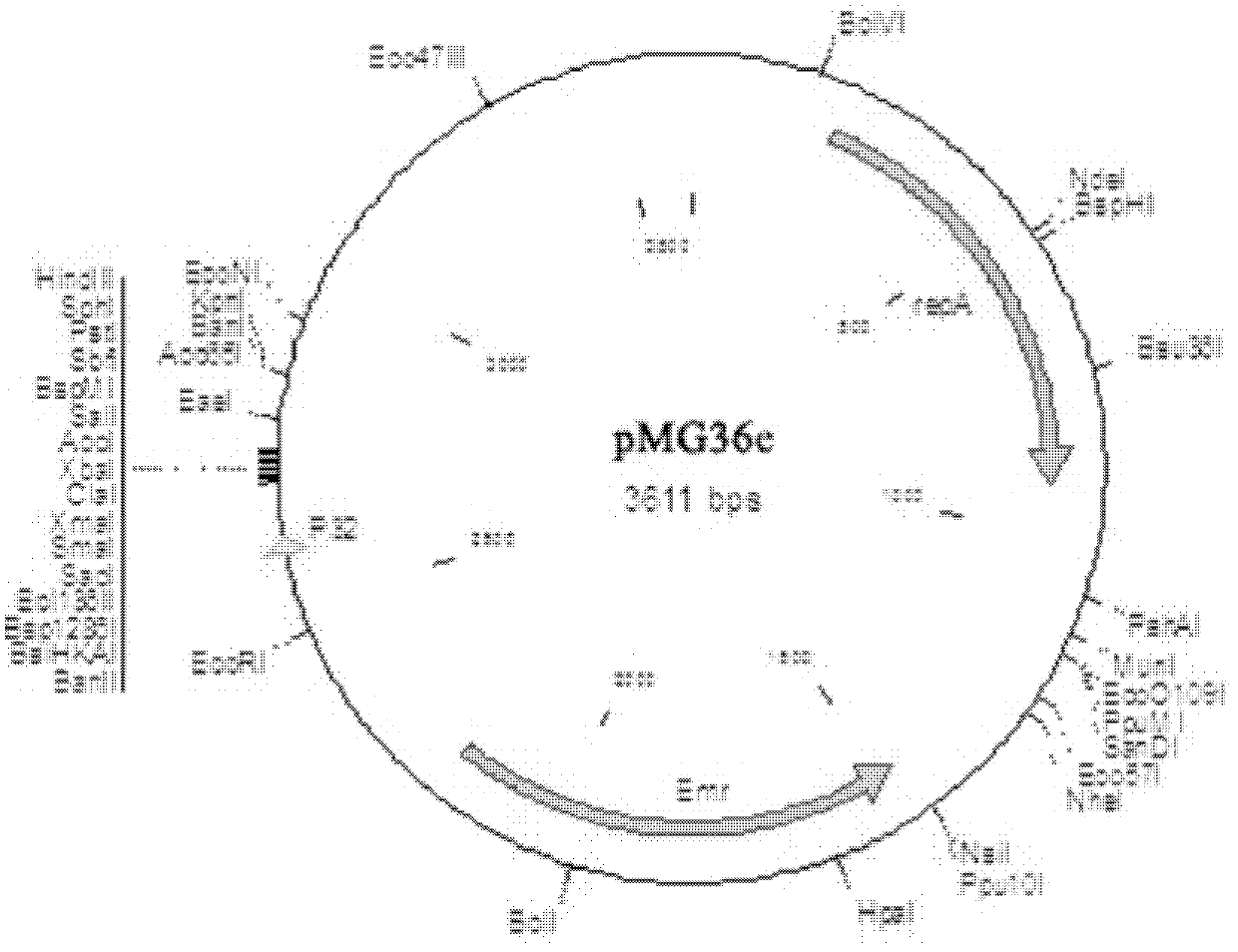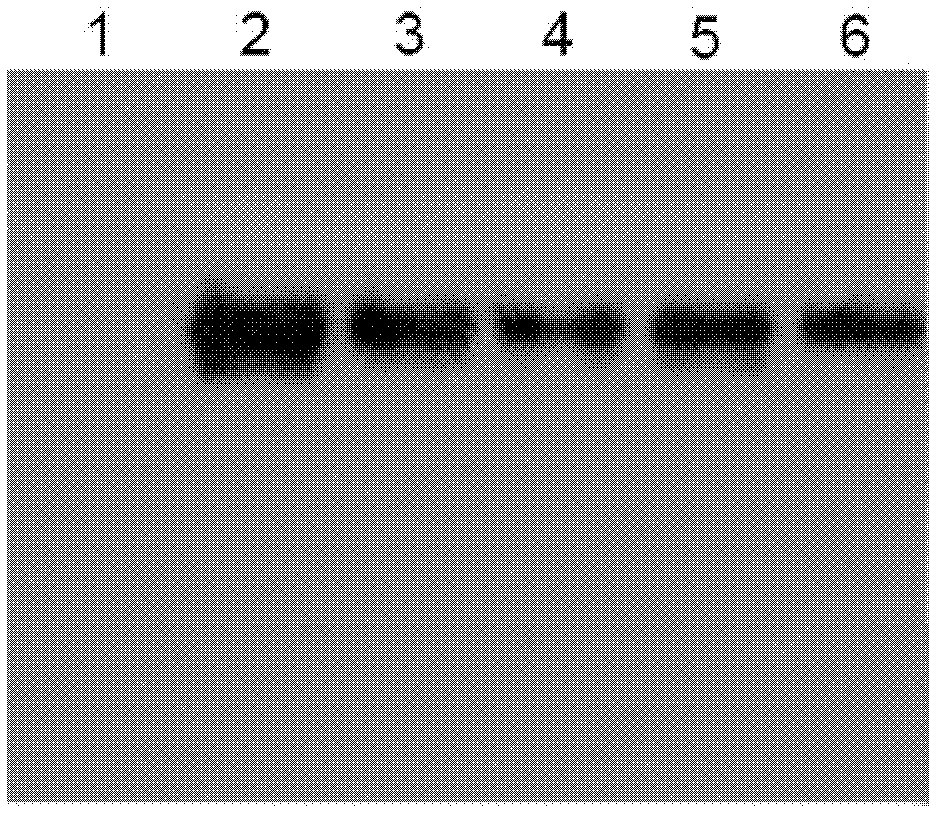Recombinant food lactic acid bacteria for preventing chronic heavy metal poisioning and preparation method and use thereof
A lactic acid bacteria, food-grade technology, applied in the field of genetic engineering, can solve problems such as teratogenicity, hindering intestinal absorption of iron, and damaging blood vessels
- Summary
- Abstract
- Description
- Claims
- Application Information
AI Technical Summary
Problems solved by technology
Method used
Image
Examples
Embodiment 1
[0092] Example 1: Acquisition of the gene encoding α-galactosidase in Lactobacillus plantarum
[0093] Plant Lactobacillus plantarum (Orla-Jehsen) Holland, ATCC11095, Guangdong Microbial Culture Collection Center, number: GIM1.191) bacterial strain on GM17 plate [composition: 3.725% M17 broth (M17Broth, purchased from Biokar Diagnostics, France), 0.5% glucose, 1.5% agar powder] for strain activation, and anaerobic culture at 37°C for 48h. Then, pick a single clone and transfer it to GM17 liquid medium [ingredients: 3.725% M17 broth, 0.5% glucose], anaerobic static culture at 37°C until OD 600 =0.6, the bacteria were collected by centrifugation and genomic DNA was extracted using a bacterial genome extraction kit (TaKaRa MiniBEST Bacterial Genomic DNA Extraction Kit Ver. 2.0, purchased from Dalian Bao Biological Engineering Co., Ltd., Dalian, China). Using the genomic DNA as a template, add mel AF (SEQ ID NO.12) and mel AR (SEQ ID NO.13) (both synthesized by China Shanghai San...
Embodiment 2
[0094] Embodiment 2: Construction of recombinant food-grade lactic acid bacteria expression vector pMG36m
[0095] The wild-type Lactococcus lactis MG1363 (purchased from NIZO Co. Ltd., Catalog: ELS09000-01, Netherlands) containing the pMG36e plasmid was cultured on an EGM17 solid culture plate containing erythromycin antibiotics (ingredients: 3.725% M17 broth, 0.5% Glucose, 1.5% agar powder, and erythromycin with a final concentration of 10 μg / ml) were streaked for culture. After 36 hours of anaerobic culture at 37°C, pick a single colony from the plate medium and inoculate it into EGM17 liquid medium containing erythromycin antibiotics (ingredients: 3.725% M17 broth, 0.5% glucose, final concentration of 10 μg / ml red Mycin), 37 ℃ anaerobic static culture to OD 600 = 0.6. The bacteria were collected by centrifugation and the plasmid pMG36e was obtained by using a plasmid extraction kit (TaKaRa MiniBEST Plasmid Purification Kit Ver.2.0, purchased from Dalian Bao Biological En...
Embodiment 3
[0096] Example 3: Construction of recombinant expression plasmid pMG36m-GSMT
[0097] Send the DNA fragment encoding the fusion protein composed of glutathione S-transferase, small molecule ubiquitin-related modifier mature peptide and human metallothionein type IA to Guangzhou Jetway Biotech Co., Ltd. Ltd., China) for total gene synthesis. This DNA fragment was used as a template, GSMT-F (SEQ ID NO.14) and GSMT-R (SEQ ID NO.15) were used as upstream and downstream primers, and then dNTP (each 2.5 μmol L -1 ) 10 μl, 10 μl of 10x PCR pfu buffer and 1 μl of pfu Taq DNA polymerase (5U / μl), add water to a total volume of 100 μl, follow the standard PCR reaction conditions (94°C denaturation for 4 minutes and then cycle, the cycle parameter is 94°C denaturation 30 seconds, 58°C annealing for 30 seconds, 72°C extension for 180 seconds, a total of 25 cycles) to amplify the target fragment. The target DNA fragment was detected and recovered by electrophoresis and named as GSMT (SEQ ...
PUM
| Property | Measurement | Unit |
|---|---|---|
| molecular weight | aaaaa | aaaaa |
Abstract
Description
Claims
Application Information
 Login to View More
Login to View More - R&D
- Intellectual Property
- Life Sciences
- Materials
- Tech Scout
- Unparalleled Data Quality
- Higher Quality Content
- 60% Fewer Hallucinations
Browse by: Latest US Patents, China's latest patents, Technical Efficacy Thesaurus, Application Domain, Technology Topic, Popular Technical Reports.
© 2025 PatSnap. All rights reserved.Legal|Privacy policy|Modern Slavery Act Transparency Statement|Sitemap|About US| Contact US: help@patsnap.com



